On July 18, a teacher at Seoul Seo2 Elementary School took her own life, leaving the nation in shock. She was a young teacher who had just started her career, but it was later revealed that she suffered from extreme stress due to malicious complaints from parents. Following the incident, numerous cases of infringement on teaching rights have come to light, and teachers across South Korea have staged rallies calling for the enactment of new laws to protect teachers from declined teaching authority.
According to a survey of 2,390 elementary school teachers conducted by the Elementary School Teachers Union from July 21 to 24, 99.2 percent of the respondents had experienced infringements of their teaching rights, specifically in the form of spiteful complaints from parents, students’ refusal and defiance against teaching guidance, and abusive language and violence from parents and students.
Despite these troubling statistics, the outpouring of sympathy over recent tragedies involving abused teachers serves as an indication that both students and teachers should be respected. Teachers and their supporters have raised their voices for improvements to the educational field.
On Sept. 21, the National Assembly accordingly passed the Teacher Rights Restoration Bill, which includes laws protecting teachers from indiscriminate child abuse reports, safeguarding educational activities from malicious complaints by parents, strengthening protective measures for victims, and giving the obligation to balance the rights and responsibilities of guardians.
However, many have criticized the content of the bill as it is ambiguous and lacks concrete terms, while teachers claim that there is still a long way to go.
Prospective and incumbent teachers call for reviving teaching authority and public education
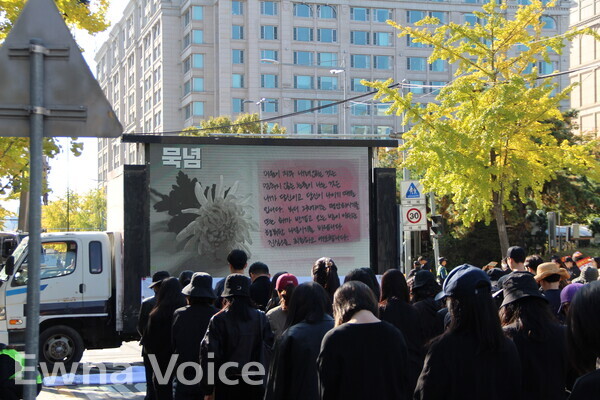
After the suicide incident of the Seoul Seo2 Elementary School teacher, many teachers, both prospective and currently employed across the country, showed their resentment and disappointment about the decline of teaching authority.
Yoo Hamin, a freshman from the Department of English Education, shared that reading numerous articles about parents or students bullying teachers has opened her eyes as to how ubiquitous this problem is.
“When I decided to major in English education, I did so to become a teacher, but I am reconsidering my dream nowadays,” Yoo said. “I cannot escape the thought, ‘Would I be able to become the teacher I have envisioned in the current situation of the educational field?’”
In order to improve the current situation, Yoo believes that teachers’ rights should be respected in tandem with those of students.
“Before the recent events, only people who are or will be in the education field knew about the gravity of the issue,” Yoo said. “Showing concern about this situation and voicing opinions on the issue is the first step to respecting teacher’s rights.”
Kim Bo Young, an elementary school teacher with 21 years of experience, revealed her mixed thoughts after the current issue. In fact, she has been contemplating whether to leave the profession due to her belief in the improbability of improving the university entrance examination system, which continues to generate chronic issues within the education sector. However, she simultaneously expressed a strong desire to remain within the field of education and contribute to creating a better learning environment for her own children.
Kim shared her experiences of her rights in school being infringed, such as hearing inappropriate comments from parents and even being assaulted by students.
From Kim’s perspective, various aspects of the teaching profession require reform to safeguard the rights of educators.
“One such necessary reform is regulation of contact information exchanged between teachers and parents,” Kim said. “Communication between teachers and parents should be permitted only during office hours, thereby moving away from the current situation where parents have unrestricted freedom to contact teachers 24 hours a day.”
Additionally, Kim explained that many teachers work in conservative and strict working relationships and are unable to communicate freely with their boss. She stressed that schools should be changed as they often hinder teachers’ attempts to effectively address and resolve the problems, often leading to escalation of the issues.
Furthermore, Kim cited South Korea’s university entrance examination system as the root cause of various recent infringements of teaching rights. Although the national goal of school education is to allow students to develop their holistic human form, the actual education they receive is aimed at making impressive results in the entrance exams.
“Neglect over public education in favor of private education and overheated competition have spoiled the essence of education, making it difficult for students to grow as responsible citizens and reducing teaching rights overall,” Kim said. “A paradigm shift in the university admission system is needed to restore teaching authority and normalize public education.”
In order to bring immediate change, teachers began to actively call for the restoration of teaching authority. They have held large-scale demonstrations in Seoul every Saturday since the first rally, which took place on July 22.
On Oct. 28, more than 10,000 teachers gathered at the National Assembly building to hold a rally. This marked the 11th of such demonstration held to urge a substantial revision to the Child Welfare Act, which is the main reason teachers are vulnerable to child abuse lawsuits. Although the Child Welfare Act was enacted to protect children from abuse, as the act vaguely defines physical and emotional abuse, teachers are often sued by parents who claim that teachers’ educational guidance was child abuse. Besides in-service teachers, university students majoring in education and other citizens supporting teachers also participated in the rally. Staff were deployed at the site to distribute slogans and maintain order, and everyone who took part did all so peacefully. The protest was composed of chants and speeches of teachers sharing their experiences. A handful of participants who listened sympathetically shed tears.
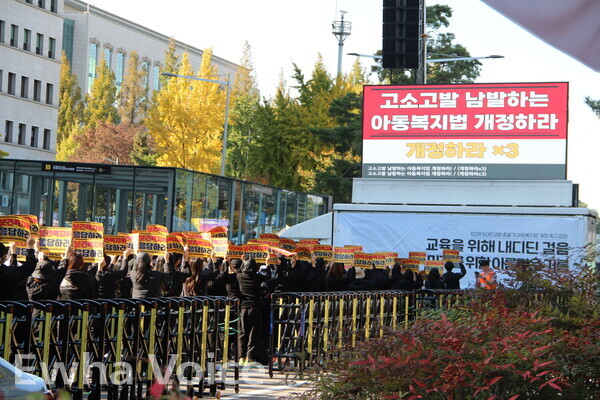
A teacher who wished to be referred to by the name Joy has worked as an elementary school teacher for about a year. She chose to participate in the rally after receiving spiteful complaints as a teacher and witnessing various issues of violation of teaching rights such as those which have been publicized in recent media reports.
Joy was shocked when she first encountered issues related to the fall of the teaching authority. Many teachers, herself included, felt surprised, frustrated, and bitter because they believed that their rights in the classroom were not protected and that an environment for proper education was absent. In particular, in the highly-publicized case of the Seoul Seo2 Elementary School teacher, she felt that it hit closer to home because she herself had been newly appointed.
“In addition to the recent publicized incidents, there have been numerous cases of teachers who were falsely accused of child abuse,” Joy said. “As these cases continued to accumulate, teachers were encouraged to not engage in educational activities, and we continue to be anxious that we might be accused of child abuse if we offended students or their guardians at all.”
Joy shared her experience of receiving a call from a parent asking whether the homeroom teacher knew that a student heard an unpleasant comment from another student in a different class. She expressed that this kind of experience makes it difficult for teachers to actively conduct educational activities.
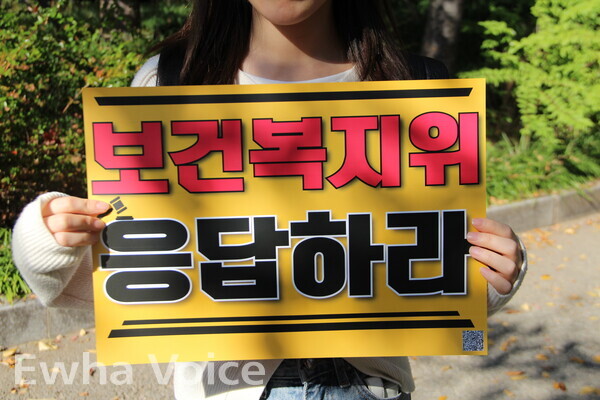
Regarding the Teacher Rights Restoration Bill, which contains safeguards against indiscriminate reports of child abuse and protection of teachers from malicious complaints, Joy thinks that this signals a step forward in the goal of restoring teaching authority. However, she does not think that it will mean much if specific details are not prepared. In particular, she pointed out that the current regulations are vague and that there should be a separation of the teacher and the student in case of infringement of teaching rights.
Joy expressed her gratitude to receive public support as the recent incidents of teaching rights violations have become public. Nevertheless, to eventually save teachers from indiscriminate child abuse reports, the Child Abuse Punishment Act must be revised, and to this end, teachers should continue to seek improvements to their rights.
“After becoming a teacher and observing the environmental and institutional difficulties first-hand, I was very embarrassed about my inattention to teaching authority when I was a student studying to become a teacher,” Joy shared. “Since the situation is improving, I hope prospective teachers think of it as their job and participate for a better future rather than being pessimistic.”
Not only in-service teachers but also teachers in training were spotted at the rally.
Eom Nayeong, a freshman majoring in elementary education at Gongju National University of Education, felt that the teaching environment she would experience in the future seemed to be different from her expectations after seeing the news about the fall of teaching authority. She participated in the rally on Sept. 2 to help improve the future workplace of her and her peers.
Although it was tiring to travel to Seoul by public transportation, Eom felt revitalized after arriving at the National Assembly where she saw many in-service and pre-service teachers and realized that everyone was striving for the same goal. At the rally, she was able to sympathize with the participants by seeing teachers and professors speaking out for the normalization of public education.
Eom observed that teachers showed an orderly appearance at the rally which upheld the purpose of elementary education in the revised curriculum of 2022 to cultivate “democratic social citizens.”
“At first, I was worried about whether our voice would be heard properly in such a quiet forum, but I felt that the rally of teachers who showed responsibility was meaningful as teachers are the first adult students to meet besides their parents,” she said. “I hope for happy classrooms where both students and teachers are respected.”
Jeong Inseo, a freshman majoring in elementary education at Gongju National University of Education, also shared how she felt after encountering cases of the infringement of teaching authority.
“I was angry and sad because I felt like teachers have become people who cannot show love because of anxiety of becoming an abusive teacher, not a person who truly loves and educates students,” Jeong said.
Participating as a member of the school’s student council, Jeong worked hard with the members to provide a place for students to unite and ultimately participate in the rally to solve the problem.
Apart from the rallies organized at Seoul’s National Assembly, local demonstrations have taken place on university campuses. On Sept. 4, simultaneous rallies were held at every university of education across the country to commemorate the death of the Seoul Seo2 Elementary School teacher. Jeong was moved to see students wearing black and speaking out for a better future.
Regarding the legislation of the Teacher Rights Restoration Bill, Jeong shared a similar view that it was meaningful but that the content is still ambiguous.
In her future as a teacher, Jeong explained that she does not want to be accused of emotional child abuse for indicating that the child guessed the wrong answer for a question or accused of sexual harassment for correcting a student’s posture in physical education class.
“I think it is selfish to ignore the situation while teachers are trying to restore their rights, as I will be working in the field in the near future,” Jeong expressed. “Restoring teaching authority is a step toward better education, so I will continue to work hard, and I hope that the education environment will improve soon.”
Educational experts urge rebalance between teacher-student-parents
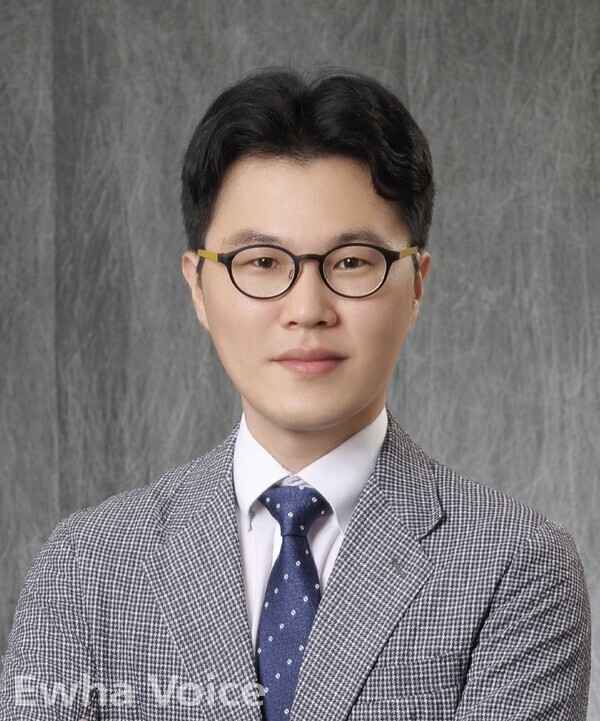
Professor Im Soo-hyun from Hanyang University explained that a combination of factors ultimately caused the fall of domestic teaching rights. While working as an elementary school teacher before assuming his current position, Professor Im shared that he felt public education interestingly tends to be perceived as a service rather than a public good.
“Parents might expect their children to receive attention almost to the level of personal childcare,” Professor Im said. “That level of care is simply not feasible in a classroom of about 20 to 30 students.”
While Professor Im placed emphasis on social perceptions as reflected in parents’ expectations of teachers, Professor Shin Tae Seob from the Department of Education, who is also the deputy director of Ewha’s Institute of School Violence Prevention (ISVP), addressed the lack of teaching rights being stipulated in the forms of texts.
Since last September, Professor Shin has carried out research on the notification of teachers’ student life guidance work and presented his research at the forum co-hosted by the Ministry of Education and ISVP to discuss teaching rights issues in August.
While student rights have recently been on the rise as shown in the Ordinance of Student Rights that enumerates and specifies student rights in detail, Professor Shin explained that there are few guidelines protecting teaching rights in texts. In addition, there are neither clear grounds for parents that outline what requests to teachers are justifiable nor set judgment calls that can determine parents have violated teaching authority.
More essentially, the balance between teachers, students, and parents has been broken due to unilateral demands and requests. To resolve this issue, Professor Shin stressed the restoration of the balance within the educational community.
Regarding the Teacher Rights Restoration Bill, Professor Im cautiously suggested that although improvements will be made through the new law, the ultimate solution remains unknown. The Teacher Rights Restoration Bill is meaningful in the sense that the plans are specified and clarified by preparing measures to protect teachers from parents’ complaints and clarifying each school’s responsibility. However, Professor Im is still in doubt about the effectiveness of the law. Until now, though solutions to the problem of the infringement of teaching rights have not come in the form of law, they are unspoken rules that were generally accepted and followed in the school community and society.
Accordingly, teachers have been raising their voices for improved immunity to child-abuse claims and the revision of related laws to protect teachers from the fall of teaching rights. As a response, lawmakers are currently discussing bills that would meet teachers’ wishes.
Professor Im also explained that the supplementation of the law regarding the Punishment of Child Abuse Crimes is what teachers in the education field want more of after the new law. This is because reports related to emotional abuse can still occur despite the new bill being implemented. However, he expressed that caution should be exercised over the revision of the law, and better social awareness must be prioritized over legal approaches.
Professor Im insisted that teaching rights have been understood only from the standpoint of defense rights, which can be seen just by looking at the sheer lack of present systems. As such, Professor Im emphasized that active measures are needed now to protect teaching rights along with a more fundamental increase in social awareness.
“Teachers in the classroom now are more qualified than ever before,” he claimed. “As such, I hope that the perception of teachers will be properly realized again, and the misunderstanding that only schools and teachers are responsible for the children’s education should also be reconsidered.”
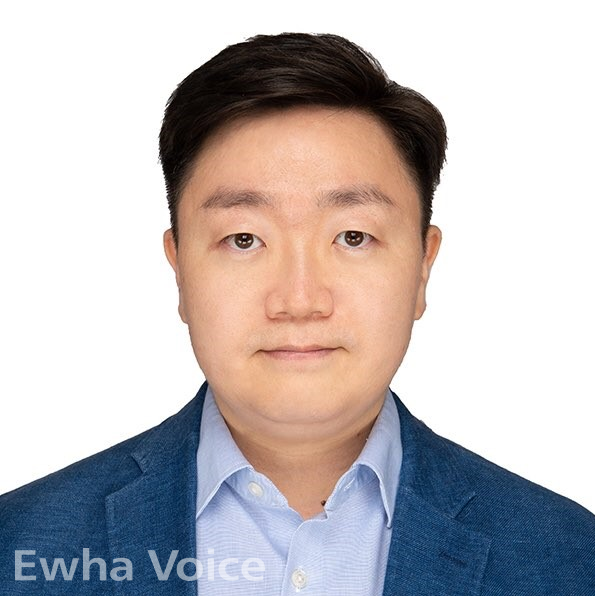
Meanwhile, according to laws from overseas on student life guidance announced by Professor Shin, the guidelines and manuals in countries such as the United Kingdom, the United States, and Finland, are well prepared and organized to guide parents.
Among the cases, Professor Shin explained about a time-out system in Summerhill, Australia. Summerhill defines student’s continuous fuss, lack of class preparation, and bullying as “problematic behaviors” and manages those students according to their time-out procedure manual. The time-out system separates students who engage in such behaviors during class by preparing a time-out space, rearranging them for a while.
But Professor Shin stressed that the balance between students, parents, and schools is the most important and ultimate solution.
“There has been a sad incident in the domestic education community recently, and because of this, I strongly hope that this opportunity will change the social atmosphere of teaching rights and bring about a society where the three agents respect and care for each other,” Professor Shin concluded.

